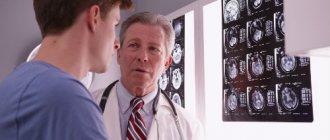Chronic lack of sleep, constant workload, stress and illness lead to the body's strength being depleted. Sluggish diseases appear that can lead to dizziness during sleep. These may be chronic diseases of the ENT organs, for example, sinusitis, or inflammatory processes in the gastrointestinal tract (inflammation of the small and large intestines). Rheumatic diseases and tuberculosis in any form can also lead to dizziness while resting at night. There is another disease that causes dizziness, it is transmitted through tick bites - Lyme disease.
A person weakened by illness notices the appearance of dizziness when he lies down to rest in the evening, and sometimes he is tormented by dreams in which he feels dizzy. Some try to find the answer in the dream book, but the answer should be sought from doctors. The cause of inadequate rest was most likely a disease that requires diagnosis and treatment.
Symptoms in a horizontal position
Dizziness is considered normal if it occurs quite rarely and under the influence of certain factors: when riding on swings, carousels and other similar attractions, when suddenly rising from a horizontal to a vertical position. This occurs because an imbalance occurs between the visual analyzing center and the vestibular apparatus due to a change in position.
It turns out that, being in a horizontal position, a person should not feel dizzy. But some patients insist that it is during a night's rest that they experience unpleasant symptoms, when they feel dizzy, sometimes accompanied by nausea and vomiting. Symptoms worsen when turning in bed. Don't expect dizziness to go away on its own. It is necessary to look for the cause that caused dizziness. These reasons may be serious changes occurring inside the body or its individual organs.
How it manifests itself
The manifestations are pronounced. A person cannot help but pay attention to this. Sometimes this can lead to disorientation and loss of coordination of movements.
Systemic dizziness is accompanied by such symptoms.
- Feeling of your own body rotating, leaning to one side. May worsen when lying down.
- Cold extremities.
- Hyperhidrosis. Localized throughout the body or in certain areas.
- The appearance of fear, lack of air.
- Numbness of some parts of the body - fingers, lips.
- Appearance of weakness, fainting state.
- Nausea, vomiting.
- Noise in ears.
- Increased heart rate.
- Increased blood pressure.
- The appearance of dark spots before the eyes, “floaters”.
- Nystagmus.
Manifestations may decrease or intensify with a sudden change in body position or head rotation. Why you feel dizzy in your sleep can be said for sure after a certain diagnosis.
A person may wake up with a feeling of fear and panic. Often, such symptoms disappear after waking up.
Dizziness when falling asleep may indicate fatigue, excessive physical exertion, or as a result of drinking alcoholic beverages. People with bad habits experience these symptoms.
The main reasons leading to dizziness
Experts tend to consider several reasons that cause dizziness while resting or being in a horizontal position. Usually this symptom is concomitant with the following diseases or conditions:
- Arterial hypertension or hypotension. Both of these diseases lead to instability of blood pressure, while a person may periodically experience unpleasant symptoms in the form of dizziness and vomiting.
- Atherosclerotic plaques block the lumen of vital vessels, and this leads to impaired blood circulation in the brain. Vascular atherosclerosis can be accompanied by unpleasant phenomena. A person notices that he feels dizzy even at rest, especially in the evening before going to bed, or in the morning, even before getting out of bed.
- Inner ear diseases are very dangerous. With otitis media (labyrinthitis), the mucous membrane of the inner ear becomes inflamed. Its cavity is filled with purulent contents, causing discomfort, tinnitus, and hearing impairment. Under pressure from the pus, the eardrum is displaced, causing the person to experience dizziness and pain in the head and ears. After the inflammation has been cured, symptoms of dizziness, ear congestion or hearing loss may still bother you for some time. The most common cause of peripheral vertigo is pathology of the inner ear.
- Violation of the vestibular function of the body is associated with Meniere's syndrome. With this disease, the tone of the vessels responsible for feeding the vestibular apparatus and auditory endings decreases. This disease leads to frequent loss of balance when walking, and vomiting may occur. Even during sleep you may experience dizziness.
- If patients complain of dizziness, a blood sugar test should be taken. Its elevated levels indicate developing diabetes mellitus. And this disease leads to changes in the condition of blood vessels and symptoms such as dizziness.
- The version of brain tumors should be considered. For this, diagnostic tests (for example, MRI) are prescribed. With tumors, a person may experience migraine-like headaches, complain of dizziness and decreased hearing or vision.
- When interviewing and examining the patient, it is necessary to clarify whether there have been any injuries to the skull. If they occur, symptoms of nausea and dizziness may be due to a concussion or cerebral edema.
- The patient is asked about existing diseases and medications that he is taking. Some medications have side effects such as vomiting, nausea, and dizziness.
- Poor nutrition and long-term food restrictions (fasting) can lead to the body not receiving enough of the vitamins and microelements it needs. Hence the feeling of fatigue, poor sleep, nausea, and dizziness at night.
- Heart disease (for example, tachycardia, bradycardia, arrhythmia) leads to deterioration of blood circulation: weakness, anxiety, dizziness.
- Benign positional vertigo occurs not only when standing up abruptly. Nausea can occur during physical activity, such as squats or running. To take the BPPV test, you should sit on a couch with your lower limbs extended and turn your head to the left, then quickly lie down in a horizontal position and turn your head to the right. After this, you will need to slowly rise to a vertical position.
Meniere's disease: why do you feel dizzy?
Dizziness is always an alarming symptom. It does not appear in a healthy body; it certainly has a reason. Even a single dizziness may indicate that something is wrong in the body, and if this happens regularly, it’s definitely time to go to the doctor. The most common cause of dizziness is ear inflammation, but you should not rush to treat it yourself. Sometimes “simple” inflammation can hide a much more dangerous pathology, such as Meniere’s disease (or syndrome).
History and statistics
Meniere's disease was named after the doctor who was the first to fully describe its symptoms. In 1861, Prosper Meunier delivered a report at the Paris Academy of Sciences “On damage to the inner ear, giving symptoms of apoplectic hemorrhage in the brain.” The French doctor prepared for this report for more than 30 years.
Meniere described the symptoms of the disease as follows: “A young man of strong constitution suddenly, for no apparent reason, experiences dizziness, noise in the ear, decreased hearing, vomiting, a feeling of indescribable melancholy and a complete loss of strength; at the same time, the face becomes pale, as if about to faint. Often the patient experiences swaying or a feeling that he is about to fall, and having fallen, as if “stunned,” he cannot get up. Lying on his back, he is forced to lie with his eyes closed, since when he tries to open them, visible objects seem to him to be rotating. The slightest movement of the head increases the feeling of rotation of surrounding objects and nausea. When I try to change the position, vomiting resumes.”
The disease occurs on average in two people out of a thousand. Women get sick more often than men, city dwellers get sick more often than villagers, and mental workers get sick more often than those who work with their hands. The disease is usually detected between the ages of 40 and 60 years. Why it occurs is unknown; currently science believes that the cause is an increase in the amount of endolymph in the inner ear (endolymphatic hydrops).
Anatomy and symptoms
What is endolymph? The inner ear consists of three parts: the cochlea, the vestibule and the semicircular canals, which in turn consist of a bony framework and a membranous inner base. In the membranous part itself, the fluid is called endolymph, and around it is called perilymph. These liquids have different compositions, and in a healthy person they do not mix.
Neurological diseases
Chronic fatigue leads the body to exhaustion. Disorders of the central and peripheral nervous system appear. These may be disorders caused by stroke, Parkinson's or Alzheimer's disease, or senile sclerosis.
Mental disorders can cause not only dizziness: there is a reluctance to live, and a loss of interest in everything that is happening around. This is how endogenous depression manifests itself. A person begins to feel causeless anxiety, which haunts him not only during the day, but also during sleep. In the morning, such a patient wakes up not getting enough sleep, he is drawn to rest, depression intensifies, everything seems prohibitively difficult and almost impossible. Such a patient definitely needs the help of a psychotherapist.
When sleep rhythm is disturbed, a person experiences nightmares. In them, he feels like he is being pulled into an abyss or a whirlpool, he wakes up from severe dizziness and a feeling of anxiety. The same nightmares haunt people with mental disorders, for example, with a depressive disorder or with excessive anxiety. Nightmares do not allow a person to fully rest. They aggravate the situation, lead to the fact that a person does not get enough sleep and begins to become even more nervous, worried, aggressive or depressed. The help of a specialist in this case will be very necessary and important.
What kind of violation is this
Dizziness is not a separate disease. The symptom indicates various pathologies. They provoke disorientation in space.
A feeling of moving or moving objects is created. Manifestations are especially common among older people and women.
Diagnosis is difficult, since dizziness is unstable and can manifest itself in varying degrees. In most cases it appears suddenly, without warning signs. It is characteristic of an episodic nature - the patient feels the appearance of a push from one side to the other.
It can also occur in the form of a sensation of objects circling around. The patient sometimes feels as if he is spinning, as if after visiting a carousel. The condition lasts from several minutes to an hour.
How to help the body
To treat vertigo, it is necessary to find out the exact cause of the disease. But it is not always possible to do this. After all, you need to undergo many diagnostic measures, examinations, and visit more than one specialist. And the person needs help now, because his condition is getting worse day by day. Nightmares, anxiety, dizziness, nausea - they take you out of balance. Therefore, the doctor can prescribe medications that improve the patient’s condition even before completing a full examination. These will be remedies that relieve stress, eliminate nausea and dizziness. Medicines that improve cerebral circulation will be mandatory.
If dizziness during sleep is diagnosed, the causes of which lie in peripheral vertigo (middle ear problems), surgical intervention may be required. Endolymph drainage, labyrinth surgery, or surgery on the auditory nerve are performed.
The amount of dizziness can be reduced through a properly designed menu. The diet should be designed so that it includes foods rich in iron, magnesium, as well as essential vitamins (C, P, B). You should limit your intake of tea and coffee, it is advisable to give up chocolate and other sweets. Tobacco and alcohol addiction must also be cured. The diet should be aimed at eliminating excess fluid from the body. To do this, reduce the amount of salt and salty foods consumed daily. The total amount of fluid entering the body should not exceed 1.5 liters per day.
Before going to bed, you can take a leisurely walk in the fresh air. It would be better if it was a quiet park. To eliminate dizziness, specially designed rehabilitation exercises performed without overexertion are recommended.
Why is it dangerous?
In most cases, the condition is not dangerous. But if accompanied by such symptoms, you should immediately consult a doctor:
- dizziness appeared for the first time, accompanied by vomiting, nausea, severe headache;
- loss of consciousness;
- accompanied by weakness, hand tremors, tachycardia, hyperhidrosis, chest pain;
- does not pass more than an hour;
- sensitivity changes, weakness appears in one half of the body.
Such conditions can be dangerous not only to health, but also to life. A doctor's examination and a full diagnosis will be required.
Prevention measures
Neurologist Anastasia Busygina highlights the following preventive measures:
- do not smoke - one cigarette smoked causes vasospasm for 15-20 minutes, and carbon monoxide from tobacco smoke replaces oxygen, this leads to oxygen starvation of brain tissue;
- monitor your blood pressure - a constant increase in pressure leads to the destruction of the walls of blood vessels, loss of their elasticity, and tissue swelling;
- find out if your closest relatives have the following diseases: hypertension, atherosclerosis, previous heart attack, stroke, diabetes mellitus, thyroid diseases, blood diseases (anemia) - they are always accompanied by cerebrovascular accidents.
If you are at risk for developing cerebrovascular accidents, undergo an annual scheduled examination: blood test (determination of cholesterol, glucose levels), ultrasound of cerebral vessels (diagnosis of the main arteries of the head), blood pressure monitoring. This allows you to see signs of a violation in time and prevent complications.
MAIN
- Acute cerebrovascular accident always manifests itself with characteristic symptoms - paresis, loss of sensitivity of a limb, half of the face, speech and hearing disorders . It is very important to get medical help as early as possible: the severity of the consequences of a stroke depends on this.
- Chronic cerebrovascular accident develops gradually, the symptoms may resemble the consequences of overwork. If they occur from time to time over several weeks, this is a reason to consult a neurologist.
- Visit a neurologist at least once a year if there are hereditary risks of developing cerebrovascular accidents.
Causes of dizziness, weakness and drowsiness
You should go to the hospital if the following symptoms appear: headache, tinnitus, weakness, drowsiness. There are several reasons for these symptoms. The most harmless ones include physical fatigue, chronic lack of sleep and emotional exhaustion. Clinical manifestations in these cases often occur after a hard day at work or experienced stress.
Kazieva Aminat Ziyavovna
Neurologist
Rostov State Medical University
Experience since 2012
Prolonged psycho-emotional stress can cause neurosis. This is a functional disease of the nervous system, the changes of which are reversible with proper treatment. The disorder is more common in men and women over 30 years of age, but in the fairer sex it occurs in a more severe form. The reason for this is the emotionality of girls.
Manifestations of neurosis arise gradually
Note! Since the nervous system regulates the functioning of all organs, with neurosis the entire body suffers. Disturbances in the functioning of the gastrointestinal tract and cardiovascular system occur. They are the cause of headaches, changes in blood pressure, tinnitus, dizziness, weakness, drowsiness, nausea and other symptoms.
Kazieva Aminat Ziyavovna
Neurologist
Rostov State Medical University
Experience since 2012
The manifestations of neurosis are varied, they are similar to the symptom complex of other diseases. Therefore, only a qualified doctor will be able to understand the true cause of poor health.
When communicating with a doctor, you need to accurately describe the nature of the pathological symptoms
An experienced doctor will conduct a comprehensive examination. It will eliminate other, no less common causes of noise in the head, weakness, dizziness and drowsiness:
- vascular diseases of the neck and head: atherosclerosis, aneurysm, arterial hypertension, hypotension;
- traumatic brain injuries;
- brain tumors;
- acoustic neuritis;
- chronic otitis;
- Meniere's disease;
- impaired blood supply to the brain due to osteochondrosis of the cervical spine;
- anemia;
- diabetes;
- endocrine disorders;
- menopause in women;
- taking medications: hormonal drugs, painkillers, antipsychotics;
- intoxication with alcohol, drugs, food.
Tinnitus, dizziness and loss of energy are common symptoms in men and women, which can indicate a wide range of pathologies, from simple fatigue to brain diseases. We cannot ignore the deterioration of our health status. It is worth seeking advice from a neurologist from the SmartMed clinic by calling @.
Kazieva Aminat Ziyavovna
Neurologist
Rostov State Medical University
Experience since 2012
Diagnosis of noise in the head and weakness in the legs
Diagnosis of neurosis is difficult. Patients may complain not only of drowsiness, weakness and noise in the head, but also of incomprehensible pain in different parts of the body. However, during the examination it is not possible to detect any inflammation or infections.
With neurosis, the patient may attribute non-existent illnesses to himself, since the true cause of the noise in the head cannot be detected
In the somatoform form of neurosis, physical symptoms such as muscle cramps, numbness of the limbs or weakness in the legs are quite real. But they appear not because of problems with the body, but against the background of disorders of the nervous system.
Kazieva Aminat Ziyavovna
Neurologist
Rostov State Medical University
Experience since 2012
Diagnosis of noise in the head and weakness in the legs caused by neurosis includes: initial consultation and instrumental examination.
Examination, communication with the patient
During a personal conversation, the doctor tries to understand why the patient has noise in his head. He asks about the conditions under which the noise occurs, the frequency of its occurrence, and learns about the accompanying symptoms. With neurosis, in addition to noise in the head, the following symptoms occur:
- prostration;
- headache;
- drowsiness during the day and insomnia at night;
- mood swings;
- increased heart rate;
- apathy;
- irritability, increased anxiety;
- dizziness;
- breathing and digestive problems;
- pain in the body, arms and legs;
- "floaters" before the eyes.
To make an accurate diagnosis and exclude cardiovascular diseases, ear and thyroid diseases, the doctor prescribes a differential examination. With neurosis, the existing signs are the only clinical manifestation of the disease. The results of most tests are normal; no problems with internal organs or blood vessels are detected.
Differential diagnosis
A complete examination allows you to exclude organic pathologies that can cause loss of strength, weakness in the arms and legs, tinnitus and headaches.
You need to remain calm during the electroencephalogram
Differential diagnosis includes:
- Laboratory examination. To exclude inflammatory processes, hormonal disorders, and identify abnormalities in the functioning of internal organs, the doctor prescribes a clinical and biochemical blood test, a hormonal study, and a general urine test.
- Ultrasound of the thyroid gland, heart. Depending on the clinical manifestations, ultrasound diagnosis of other organs may be required.
- MRI of the brain, cervical spine. It is the most informative method for diagnosing any pathological processes occurring in the head and neck area. With its help, you can detect areas of ischemia, cysts, tumors, hematomas, inflammatory processes, increased intracranial pressure, and any disturbances in the tissue structure. An MRI using a modern high-precision MRI machine can be performed at the SmartMed clinic.
- EEG. An electroencephalogram of the brain can detect epilepsy, encephalopathy, conditions after a stroke, trauma and neoplasms. It is an effective method for diagnosing neuroses in men and women and helps assess existing changes. A neurologist interprets the results.
- Angiography of blood vessels. Shows atherosclerosis, arterial aneurysm, ischemic stroke and other pathological disorders of vascular origin.
- Audiogram. Allows you to identify hearing problems that may cause noise or ringing in your head.
- ECG. Shows heart rhythm disturbances, ischemia, angina pectoris.
If necessary, other specialists may be involved in the diagnosis. These include a psychotherapist. His help may be required in case of a severe mental condition of the patient.
Kazieva Aminat Ziyavovna
Neurologist
Rostov State Medical University
Experience since 2012










